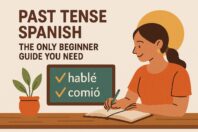27 ER Verbs In Spanish That Every Beginner Should Learn First

Get our free email course, Shortcut to Conversational.
Have conversations faster, understand people when they speak fast, and other tested tips to learn faster.
More infoIn this post, we will list the 27 most common and important ER verbs in Spanish that every student should learn first.
As a beginner, Spanish grammar can seem overwhelming, especially when you realize that there are thousands of verbs to memorize. A simple but effective strategy is to prioritize learning the most common verbs that us native speakers use on a daily basis, and over time, gradually building up your collection of verbs from there.
(PS, we already covered the 45 most common AR verbs here)
ER Verbs in Spanish: Simple Present Tense
It would be (almost) impossible to explain every conjugation for ER verbs in this post, but if you’re a complete beginner, then you should at least know how to conjugate in the simple present tense.
In the below table, you can see how “comer” (a regular ER verb) is conjugated in the simple present tense.
| Ar Endings | Personal Pronoun | Spanish conjugation | English equivalent |
| -o | Yo | Como | I eat |
| -es | Tú | Comes | You eat |
| -e | Él | Come | He eats |
| -e | Ella | Come | She eats |
| -e | Usted | Come | You (formal) eat |
| -emos | Nosotros | Comemos | We eat |
| -en | Ustedes | Comen | You (plural) eat |
| -en | Ellos | Comen | They eat |
And with that basic explanation out of the way, we can list the 27 most common ER verbs in Spanish.
Regular ER Verbs in Spanish
| # | English | Spanish |
| 1 | To eat | Comer |
| 2 | To drink | Beber |
| 3 | To run | Correr |
| 4 | To sell | Vender |
| 5 | To fear | Temer |
1. To eat / Comer
- You eat cereal every morning – Ustedes comen cereal todas las mañanas
2. To drink / Beber
- They drink orange juice at breakfast – Ellos beben jugo de naranja en el desayuno
3. To run / Correr
- Carlos runs five kilometers every day – Carlos corre cinco kilómetros todos los días
4. To sell / Vender
- I sell food in the market – Yo vendo alimentos en el mercado
5. To fear / Temer
- He fears spiders – Él le teme a las arañas
How To Deal with Irregular ER Verbs in Spanish
There’s no way to avoid using irregular verbs in Spanish.
However, as a beginner, there is a pattern that you can learn which will be helpful when it comes to remembering the conjugation of irregular ER verbs in the nosotros (we) form.
To explain this further, we are going to conjugate the irregular ER verb “Entender” (to understand) in the simple present tense.
| Person | Simple Present Tense | English |
| Yo | Entiendo | I understand |
| Tú | Entiendes | You understand |
| Usted | Entiende | You understand |
| Él / Ella | Entiende | He / She understands |
| Nosotros | Entendemos | We understand |
| Ustedes | Entienden | You understand |
| Ellos | Entienden | They understand |
You’ll notice that each conjugation, except first person plural (nosotros), keeps the same pattern of change “entiendo”, “entiendes”, “entiende” and “entienden”
However, the conjugation for “nosotros” (we) maintains the core of the infinitive form of the verb, “entendemos”.
Most irregular ER verb will follow this pattern ( “Ser” and “Haber” are exceptions)
Most Common Irregular ER Verbs In Spanish
Now let’s review the most common irregular ER verbs in Spanish that you should know.
| # | English | Spanish |
| 6 | To be | Ser |
| 7 | To have | Haber |
| 8 | To have | Tener |
| 9 | To do | Hacer |
| 10 | To know | Conocer |
| 11 | To understand | Entender |
| 12 | To read | Leer |
| 13 | Want | Querer |
| 14 | To put | Poner |
| 15 | To come back | Volver |
| 16 | To bring | Traer |
| 17 | To know | Saber |
| 18 | To see | Ver |
| 19 | To move | Mover |
| 20 | To fall | Caer |
| 21 | To protect | Proteger |
| 22 | To fit | Caber |
| 23 | To be born | Nacer |
| 24 | To seem | Parecer |
| 25 | To be able to / Can | Poder |
| 26 | To smell | Oler |
| 27 | To dawn | Amanecer |
Examples:
6. To be / Ser
- We are friends since we were children – Nosotros somos amigos desde niños
7. To have / Haber
- There is a lot of food in the fridge – Hay mucha comida en la nevera
8. To have / Tener
- She has to work tomorrow – Ella tiene que trabajar mañana
9. To do / Hacer
- They do their work on time – Ellos hacen su trabajo a tiempo
10. To know / Conocer
- I know that place, it’s very nice – Yo conozco ese lugar, es muy bonito
11. To understand / Entender
- You understand Spanish very well – Tú entiendes muy bien el español
12. To read / Leer
- I read the newspaper every morning – Yo leo el periódico todas las mañanas
13. To want / Querer
- Do you want to go to the pool tomorrow? – Quieres ir a la piscina mañana?
14. To put / Poner
- You always put that song in the office – Tú siempre pones esa canción en la oficina
15. To come back / Volver
- When are you coming back to college? – Cuando vuelves a la universidad?
16. To bring / Traer
- You bring the food to the house – Tú traes la comida a la casa
17. To know / Saber
- I know how to speak Spanish – Yo se hablar español
18. To see / Ver
- We do not see any problem – Nosotros no vemos ningún problema
19. To move / Mover
- She moves her body when listening to music – Ella mueve su cuerpo al escuchar la música
20. To fall / Caer
- My uncle fell out of the chair, but it’s okay – Mi tío cayó de la silla, pero está bien
21. To protect / Proteger
- I protect my family – Yo protejo a mi familia
22. To fit / Caber
- We do not fit in the car, we’ll call a taxi – No cabemos en el carro, llamaremos un taxi
23. To be born / Nacer
- My son borns next week – Mi hijo nace la próxima semana
24. To seem / Parecer
- The situation seems normal – La situación parece normal
25. To be able / Poder
- I Am able to go next week – Yo puedo ir la próxima semana
26. To smell / Oler
- The wine smells exquisite – El vino huele exquisito
27. To dawn / Amanecer
- We can go to the pool if the day dawns sunny – Podemos ir a la piscina si el día amanece soleado
Practice: ER Verbs in Spanish
Identify the infinitive form in the following sentences
- A José le gusta correr en las mañanas
- Mi hermana y yo necesitamos vender el carro
- Mis amigos prefieren beber cerveza
- Los niños quieren ver la película
- Deberías hacer tu tarea
- Te recomiendo leer ese libro
- Pensamos en traer comida pero no pudimos
- Espero conocer esa ciudad pronto
- Puedes poner otra canción por favor?
- Eso no puede ser, debe haber un error
- Me encanta comer ensalada
- Podrías mover tu carro al estacionamiento por favor?
- A ella le encanta oler las flores
- Nuestro bebé va a nacer en septiembre
- Cuidado! Te puedes caer
Answers
- A José le gusta correr en las mañanas
- Mi hermana y yo necesitamos vender el carro
- Mis amigos prefieren beber cerveza
- Los niños quieren ver la película
- Deberías hacer tu tarea
- Te recomiendo leer ese libro
- Pensamos en traer comida pero no pudimos
- Espero conocer esa ciudad pronto
- Puedes poner otra canción por favor?
- Eso no puede ser, debe haber un error
- Me encanta comer ensalada
- Podrías mover tu carro al estacionamiento por favor?
- A ella le encanta oler las flores
- Nuestro bebé va a nacer en septiembre
- Cuidado! Te puedes caer



